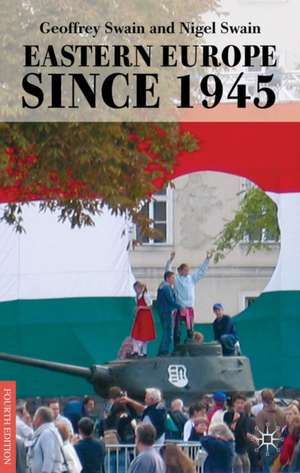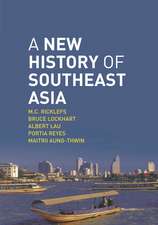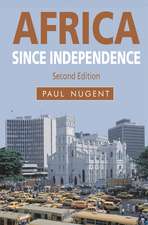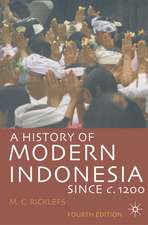Eastern Europe since 1945
Autor Geoffrey Swainen Limba Engleză Paperback – 30 sep 2009
Covering all the countries which comprise Eastern Europe, Geoffrey and Nigel Swain provide a clear account of:
• the origins of the socialist experiment
• the 1956 crisis of de-Stalinisation
• how society and economy operated between 1956 and 1989, the years of 'actually existing socialism'.
Drawing on what is now a perspective of twenty years, the authors identify trends in the transition from socialism to capitalism and explore the important role played by the prospect of EU membership in shaping the politics of what was once Eastern European capitalism. The new edition also features helpful suggestions for reading to aid further study.
Preț: 226.63 lei
Nou
Puncte Express: 340
Preț estimativ în valută:
43.36€ • 45.40$ • 35.88£
43.36€ • 45.40$ • 35.88£
Carte tipărită la comandă
Livrare economică 01-07 aprilie
Preluare comenzi: 021 569.72.76
Specificații
ISBN-13: 9780230214606
ISBN-10: 0230214606
Pagini: 335
Ilustrații: 12 b/w tables, 1 maps
Dimensiuni: 155 x 235 x 20 mm
Greutate: 0.45 kg
Ediția:Revizuită
Editura: Macmillan Education UK
Colecția Palgrave
Locul publicării:London, United Kingdom
ISBN-10: 0230214606
Pagini: 335
Ilustrații: 12 b/w tables, 1 maps
Dimensiuni: 155 x 235 x 20 mm
Greutate: 0.45 kg
Ediția:Revizuită
Editura: Macmillan Education UK
Colecția Palgrave
Locul publicării:London, United Kingdom
Cuprins
List of Tables.- Chronology.- Map.- Introduction.- Revolution in Eastern Europe.- Different Roads to Socialism.- An End to Diversity.- 1956: Communism Renewed?.- Actually Existing Socialism in Operation.- Reform Communism or Economic Reform.- Neo-Stalinism Triumphant.- The Fall of Actually Existing Socialism.- Adapting to Capitalism Enthusiastically: Central Europe.- Adapting to Capitalism Hesitantly: The Balkans.- Conclusion.- Notes.- Suggested Reading.- Index.
Notă biografică
GEOFFREY SWAIN is Alec Nove Chair in Russian and East European Studies at the University of Glasgow, UK.
NIGEL SWAIN is Lecturer in History at the University of Liverpool, UK. (They're twins!)
NIGEL SWAIN is Lecturer in History at the University of Liverpool, UK. (They're twins!)
Textul de pe ultima copertă
Since its first appearance in 1993, Eastern Europe since 1945 has become an essential text for university students and others keen to understand the complex developments in the region over the last sixty years. This fourth edition has been fully revised, updated and expanded in order to incorporate new material and the events that have taken place since the publication of the previous edition.
Covering all the countries which comprise Eastern Europe, Geoffrey and Nigel Swain provide a clear account of:
• the origins of the socialist experiment
• the 1956 crisis of de-Stalinisation
• how society and economy operated between 1956 and 1989, the years of 'actually existing socialism'.
Drawing on what is now a perspective of twenty years, the authors identify trends in the transition from socialism to capitalism and explore the important role played by the prospect of EU membership in shaping the politics of what was once Eastern European capitalism. The new edition also features helpful suggestions for reading to aid further study.
Covering all the countries which comprise Eastern Europe, Geoffrey and Nigel Swain provide a clear account of:
• the origins of the socialist experiment
• the 1956 crisis of de-Stalinisation
• how society and economy operated between 1956 and 1989, the years of 'actually existing socialism'.
Drawing on what is now a perspective of twenty years, the authors identify trends in the transition from socialism to capitalism and explore the important role played by the prospect of EU membership in shaping the politics of what was once Eastern European capitalism. The new edition also features helpful suggestions for reading to aid further study.
Caracteristici
A new edition of an established text which covers all the countries in Eastern Europe
Revised throughout in light of recent scholarship and brings story up to the present day
Features extended discussion of the post 1989 transition to capitalism, additional illustrations and a new Further Reading section
Revised throughout in light of recent scholarship and brings story up to the present day
Features extended discussion of the post 1989 transition to capitalism, additional illustrations and a new Further Reading section













